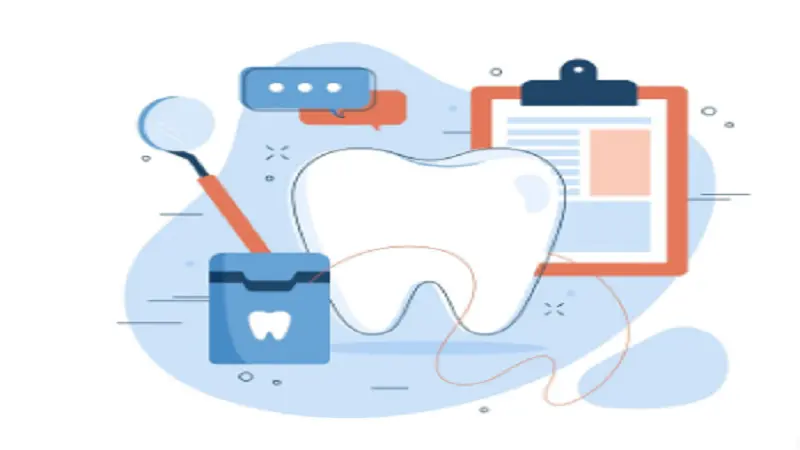Oral health refers to the well-being of our teeth, gums, and the entire mouth. It is essential for both our overall health and our quality of life. Good oral hygiene like brushing, flossing, and regular dental check-ups help prevent dental issues such as cavities and gum disease. However, many people may not realize that oral health is closely connected to general health.1
Research has shown that problems in the mouth can affect other parts of the body, leading to conditions like heart disease and diabetes. Conversely, chronic diseases can also impact oral health. Understanding this connection is essential for maintaining not just a healthy smile but overall wellness.1
The Link Between Oral Health and General Health
Good dental health is important for more than just your mouth. It affects your overall health, medical expenses, and quality of life. Here’s a detailed overview of this connection:
- Oral Health and Systemic Diseases: Emerging research emphasizes the critical connection between oral health and overall systemic health, revealing how poor oral hygiene can significantly contribute to various serious conditions. Chronic oral infections can cause inflammation that raises the risk of diabetes and heart disease. Hence taking care of your teeth and gums is important for better overall health.3 Some of these connections are described below:2
- Heart Disease: Poor oral hygiene can cause gum disease, which is linked to a higher risk of heart disease. Inflammation from gum disease may also lead to plaque buildup in the arteries which is a marker of heart disease.
- Respiratory Infections: Oral bacteria can be inhaled into the lungs, leading to respiratory conditions like pneumonia, especially in individuals with weakened immune systems or pre-existing lung conditions.
- Diabetes: There is a bidirectional relationship between diabetes and oral health. People with diabetes are more susceptible to infections, including gum disease and untreated gum disease can make it harder to control blood sugar levels.
- Complications during Pregnancy: Studies have shown that gum disease during pregnancy is often linked to premature deliveries and infants with low birth weight.
- Impact on Nutritional Status: Poor oral health can make it difficult to eat healthy foods, leading to a lack of nutrients and resulting in weakness and muscle loss. This muscle decline also affects chewing and swallowing, creating a cycle that worsens both nutrition and overall health.4
- Risk of Cancer: Some studies suggest that poor oral health may be linked to an increased risk of certain cancers, such as head and neck cancers.5
- Impact on Mental Health: Oral health issues can affect self-esteem and social interactions, leading to anxiety and depression. For example, missing teeth or poor oral aesthetics can impact one’s willingness to engage socially.6
Maintaining good oral hygiene through regular brushing, flossing, and dental check-ups can prevent many oral health issues. This preventive care is essential not just for oral health but also for mitigating risks to general health. Recognizing the connection between oral health and overall health emphasizes the need for a holistic approach to healthcare.1
Essential Tips for Maintaining Oral Health During Orthodontic Treatment
Maintaining optimal oral health during orthodontic treatment is crucial not only for achieving a beautiful smile but also for ensuring overall dental wellness. Orthodontic appliances can create unique challenges for oral hygiene, but with the right strategies, you can keep your smile healthy and vibrant throughout the process. The key tips for oral health during orthodontic treatment include
- Brush and Floss Daily: Use a soft-bristled toothbrush and floss threaders to keep teeth and braces clean.
- Use Mouthwash: An antimicrobial or fluoride rinse can assist in minimizing plaque buildup.
- Avoid Certain Foods: Stay away from sticky and hard foods if you wear braces, as these could damage the braces.
- Regular Dental Visits: Stay on track with orthodontist and dentist appointments to monitor your progress.
Invisible aligners are modern orthodontic appliances, which are custom-made plastic trays designed to gradually reposition teeth. Their discreet appearance is especially appealing to adults and teenagers looking for effective orthodontic solutions without the visibility of braces. Additionally, they have an edge over traditional braces when it comes to oral hygiene. These appliances can be easily removed for brushing, flossing, and eating, allowing for optimal oral hygiene maintenance. Plus, they have fewer food restrictions allowing you to enjoy your meals. Just remember to clean your aligners properly before you insert them each time and you are good to go. Hence, opting for aligners can enhance both oral and overall health.8
Invisible Aligners in India
Invisalign is one of the oldest brands in the clear or invisible aligner market and is recognized for its advanced technology and comprehensive approach to orthodontics. While Invisalign aligners provide a wide range of options for various orthodontic needs, they are generally more expensive than other aligner alternatives, which may be a factor for prospective patients.9
MakeO Toothsi is another prominent Indian brand that has gained popularity for its clear aligner solutions, offering personalized treatment plans and remote monitoring through its app. They focus on affordability and accessibility, making aligners more reachable for many patients in India. At Toothsi, the invisible aligner prices in India start at just ₹69,999 with flexible EMI options. It also includes an assessment from orthodontists, constant support and care by experts, and a customized aligner kit tailored to your plan.10
Other options like Smile AI and Snazzy also provide personalized aligners and track your progress throughout the treatment.
Conclusion
Maintaining optimal oral health is essential for overall health and well-being. A healthy mouth serves as a foundation for strong teeth and, at the same time plays a crucial role in preventing other systemic health issues. Regular dental check-ups, proper oral hygiene practices, and a balanced diet are vital in promoting good oral health, even when you are undergoing an orthodontic treatment. Using invisible aligners for teeth straightening allows for proper oral hygiene maintenance during treatment, not only contributing to a perfect smile but also improving oral health and overall quality of life.




